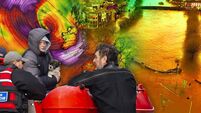‘Over there’ isn’t that far anymore

FOR most people in this country the break-up of the refugee camp in Calais this week was something happening “over there”. The camp, which was in existence for more than seven years and was known as the Jungle, was home to between 6,000 and 8,000 refugees from war-torn counties in Asia and Africa.
Among them were hundreds of unaccompanied minors who had been separated from their parents somewhere along the journey from their former homes right across a continent.














